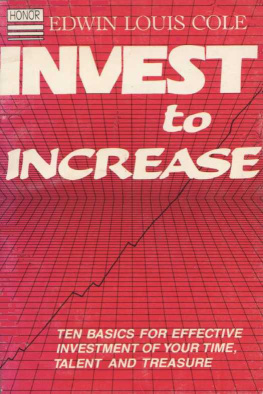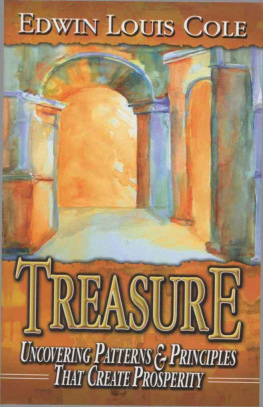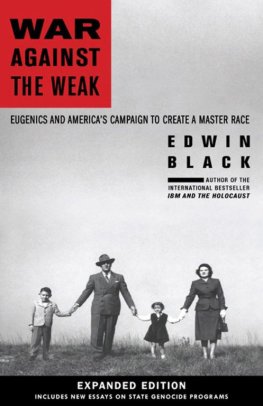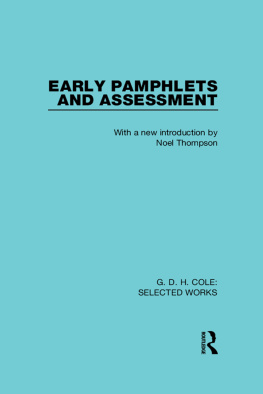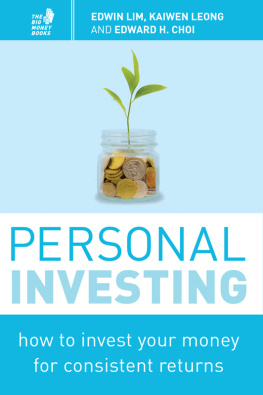Edwin Louis Cole - Invest to Increase
Here you can read online Edwin Louis Cole - Invest to Increase full text of the book (entire story) in english for free. Download pdf and epub, get meaning, cover and reviews about this ebook. genre: Religion. Description of the work, (preface) as well as reviews are available. Best literature library LitArk.com created for fans of good reading and offers a wide selection of genres:
Romance novel
Science fiction
Adventure
Detective
Science
History
Home and family
Prose
Art
Politics
Computer
Non-fiction
Religion
Business
Children
Humor
Choose a favorite category and find really read worthwhile books. Enjoy immersion in the world of imagination, feel the emotions of the characters or learn something new for yourself, make an fascinating discovery.
- Book:Invest to Increase
- Author:
- Genre:
- Rating:4 / 5
- Favourites:Add to favourites
- Your mark:
- 80
- 1
- 2
- 3
- 4
- 5
Invest to Increase: summary, description and annotation
We offer to read an annotation, description, summary or preface (depends on what the author of the book "Invest to Increase" wrote himself). If you haven't found the necessary information about the book — write in the comments, we will try to find it.
Invest to Increase — read online for free the complete book (whole text) full work
Below is the text of the book, divided by pages. System saving the place of the last page read, allows you to conveniently read the book "Invest to Increase" online for free, without having to search again every time where you left off. Put a bookmark, and you can go to the page where you finished reading at any time.
Font size:
Interval:
Bookmark:
Contents
Invest to Increase
"Use it or lose it."
That isn't exactly the way the Lord Jesus Christ said it in teaching His investment principles in the "Parable of the Pounds," but it is the essence of the "Law of Increase and Decline," which He taught in the parable.
Jesus taught about a man who, before leaving on a trip, gave his servants each a pound. When he returned, the first servant had invested and made a ten-fold increase, the second had made a five-fold increase, but the third had hidden the one pound he had received. The first and second servants were commended by their master, but he scolded the third servant for being too timid even to place his pound in a bank where he may have earned some interest on it.
The principle is: By use you possess and gain; by disuse you decline and lose.
A man with an eighteen-inch bicep who is able to lift a one-hundred-pound barbell single-handed, would be foolish to put his arm in a sling and not use it for fear of hurting it through exercise. To keep his strength, he must exercise his muscles. By so doing, he will not only keep what he has, but increase it.
To gain energy, you must give energy.
Only a fool thinks the way to retain or gain energy is by resting continually to conserve what he has. An enervation will take place through rest, while the man constantly putting himself to the test by exercising will become more and more energetic.
The principle of the parable is that hoarding causes loss, while investing will not only allow you to keep what you have, but gain more through the use of it.
The proper use of money, is to prosper by its use. It's the same with time and talent.
The business world says it this way, "It takes money to make money."
In desiring to invest, save, or own a business, many people want to start "big," "at the top," not realizing that giant oak trees come from small acorns. "Despise not the day of small beginnings" is a biblical principle.
You cannot invest thousands before investing just one, or make millions of dollars until you have made the first dollar. It's the first one that counts, all others will follow. Investing and forgiving both have the same principle start where you are with what you have.
Every man wants to invest something that will cause him to gain from it. There are three things a man can invest: time, talent and treasure. When you think of investments, do not limit your thinking to the investments of your money in stocks, real estate, or a new business. Every day of your life you invest twenty-four God-given hours in something, or some things. Every time you use your talent, either as an accountant, a trained soldier, a pilot, or any other occupation, you are investing that talent.
Here are some guidelines for investing:
1. You Invest in People.
A company is only as good as the personnel who manage or control it.
My son, Paul, called me one day asking advice concerning an investment he was contemplating making. He informed me that some very important people were investors in the company. He named some of the musical artists, pastors, influential businessmen, and others who were investing in the enterprise.
"Who owns the company, who is the president, and who is going to run it?" I asked him.
"I don't know. Why?" he asked.
"You don't invest in investors, you invest in the corporate officers," I explained. "A company, business, government, or ministry is only as good as the character of the men controlling it."
Paul did not know who the officers of the corporation were, or who they had chosen as the Chief Executive Officer, so my advice to him was to keep his money.
The newspaper this very day carried the story of a company founded by a minister who is alleged to have lost $12,000,000 of the investors' money. Many of these people had based their decision to invest in the company on the names of the other investors. One man was desolate because he had lost $250,000, his entire life's savings.
Tragic, but so common.
Con-artists obtain their reputation vicariously through association with men of good character. They use people to influence people. Devoid of integrity themselves, they cover their chicanery with the aura of honesty derived from acquaintance with men of real worth.
Just because a man calls himself a "brother," does not mean that he has the character or ability you want to invest in. "You are not to keep company with anyone who claims to be a brother Christian but...is a swindler.... Don't even eat lunch with such a person,"1 is the scriptural injunction. Avoid such a person; he has a rapacious character.
A swindler in church is still a swindler. Saintly sinners are still sinners.
When you invest, remember you are investing in the character of the company, which is derived from the character of the men managing it.
2. Before Investing, Investigate.
Integrity is the essence of character faithfulness is the cornerstone.
"Only a simpleton believes what he is told! A prudent man checks to see where he is going,"2 is what the proverb says.
Your peace of mind and heart is the best evidence that what you are doing is right.
Peace is the umpire for doing the will of God.
Integrity is needed by both parties in an investment.
Wallace sold everything he had to buy an interest in an automobile firm with a man he had come to know through association in church activities. Six years later, Wallace left town after having lost everything. He came to see me after he had moved away to escape from the place of his tragedy and trauma.
We sat on the jetty overlooking the harbor near where I live, and he told me what had happened. When he finished, I asked him when it was that he knew he was in trouble and would lose it all.
"I realized it when we made the deal," he said. "At the very moment we shook hands in the living room of my home, I knew it was wrong."
"Why under God's heaven did you go through with it?" I asked.
"Because I didn't want to face the fact that it was wrong. I was too embarrassed to admit that I had made a mistake," he confessed to me.
"You mean, Wally, that you went ahead and lost everything just because of your pride?"
He nodded. He hadn't been honest with himself. He hadn't finished his investigation by looking into his own spirit to see if there was peace there.
An internal witness is always better than an external circumstance.
Fortuitous circumstance can be blown away with any passing wind, but the peace the Lord gives is an anchor to the soul.
Investigate, then let the peace of God be your umpire for doing His will in your life.
3. Risk, Don't Gamble.
Everything in life has risk. You must take risks in whatever venture you undertake and every time you make a decision. But risk is different from gambling. Gambling is risking on chance.
"Wealth from gambling quickly disappears; wealth from hard work grows,"3 says Proverbs.
One world-famous gambler wrote in his autobiography why he believes he is successful while most other gamblers die penniless: "When I'm hot, I'm hot," he wrote. "When I'm not, I quit!"
There is a season to everything under the sun. There is seedtime and harvest, and the season can't be changed. Seedtime never follows harvest, any more than spring follows summer.
There are seasons in life also. Seasons to sow, seasons to reap. Only a fool will try to harvest in springtime. Knowing the seasons in lifewhen the time has come to sow by investing, or to wait is vital to being able to reap the increase.
God's Word tells us to "be instant in season, out of season...."4 meaning that constancy is one of the virtues of manhood.
Our constancy in our relationship with the Lord will cause us to recognize our seasons of sowing, waiting, or reaping, and keep us from regarding a gamble as a risk.
Font size:
Interval:
Bookmark:
Similar books «Invest to Increase»
Look at similar books to Invest to Increase. We have selected literature similar in name and meaning in the hope of providing readers with more options to find new, interesting, not yet read works.
Discussion, reviews of the book Invest to Increase and just readers' own opinions. Leave your comments, write what you think about the work, its meaning or the main characters. Specify what exactly you liked and what you didn't like, and why you think so.

